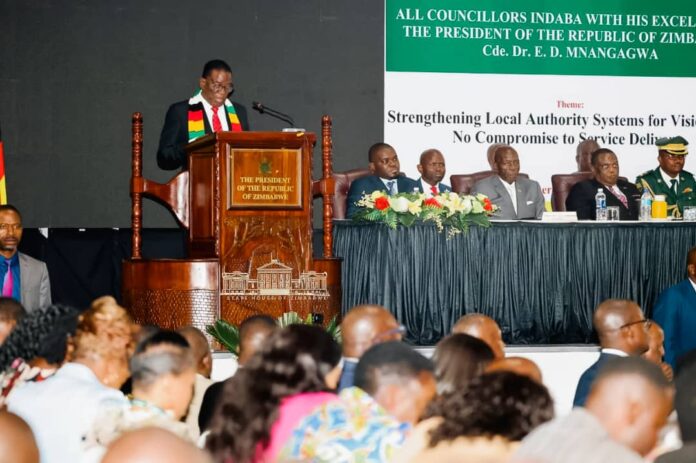In the ever-evolving landscape of governance and public service, one fundamental principle remains clear: the citizens’ needs and welfare must always come first. In line with this principle, His Excellency, President Dr. Emmerson Dambudzo Mnangagwa’s recent call to action on modernizing local authority operations presents an essential roadmap towards achieving a brighter, more efficient, and service-oriented future for Zimbabwe by 2030.
The Importance of Service Delivery
In his statement, President Mnangagwa unequivocally emphasized that “No compromise to service delivery is the first stage of interventions to modernize the operations of local authorities towards a 2030 Vision.” This profound message sets the tone for the trajectory of local governance in Zimbabwe, acknowledging the pivotal role local authorities play in improving the quality of life for citizens. Effective service delivery is the backbone of any community—be it in the form of health services, education, infrastructure, waste management, or even the provision of clean water.
By addressing the very foundation of governance—service delivery—the government is signaling a paradigm shift that aligns with global best practices in municipal management. It is a call to action, urging local authorities to re-evaluate their current operations, innovate, and ensure no compromise on the services they provide.
Stage One of the Modernization Agenda: A Renewed Commitment to Service Delivery
 The President’s vision for 2030 is to position Zimbabwe as an upper-middle-income economy by the year 2030. This vision cannot be realized without local authorities that are responsive, efficient, and accountable. Hence, the first step in this transformation process is to ensure that the core function of local governments—service delivery—remains unimpaired.
The President’s vision for 2030 is to position Zimbabwe as an upper-middle-income economy by the year 2030. This vision cannot be realized without local authorities that are responsive, efficient, and accountable. Hence, the first step in this transformation process is to ensure that the core function of local governments—service delivery—remains unimpaired.
Local authorities often grapple with challenges such as inadequate funding, lack of technical expertise, inefficient administration, and infrastructural decay. These challenges are compounded by rapid urbanization, a growing population, and an increasing demand for improved living standards. However, the solution lies in not just increasing financial allocations but also in optimizing existing resources, fostering innovation, and ensuring transparency and accountability in operations.
A “no-compromise” approach means that local authorities must prioritize the needs of the citizens above all else, ensuring that every service provided meets the standards of quality, accessibility, and reliability. From improving road networks to enhancing public health systems, the mandate is clear: excellence in service delivery must be non-negotiable.
Institutional Reforms: Building Capacity at the Local Level
The modernization of local authorities cannot be achieved overnight, but it can be accelerated by a structured approach that includes capacity building, digital transformation, and enhanced governance structures. This requires investment in human capital and technology, enabling local authorities to operate more efficiently and in a manner that is responsive to the needs of the people.
President Mnangagwa’s directive provides the much-needed impetus for local authorities to invest in digital solutions that can streamline operations and facilitate more effective communication with citizens. For example, digital platforms can be used for real-time monitoring of public service delivery, allowing citizens to track the progress of ongoing projects and hold their leaders accountable. This fosters a culture of transparency and trust, while also providing opportunities for feedback and continuous improvement.
Aligning Local Authorities with National Development Goals
Local authorities are the engines of community development. When they function optimally, they directly contribute to national development goals, creating ripple effects that improve social welfare and economic stability. In light of this, local authorities must align their operations with the broader national vision of becoming an upper-middle-income economy by 2030. This means not only improving public service delivery but also being active partners in key national projects such as infrastructure development, health and education initiatives, and poverty alleviation programs.
By modernizing their operations, local authorities can play a crucial role in the successful realization of Zimbabwe’s 2030 Vision. In this way, their success will be intertwined with the success of the nation, fostering a sense of shared responsibility and collective progress.
Accountability and Citizen-Centric Governance
At the heart of modernizing local authorities lies the concept of citizen-centric governance. In a world where information is readily available and public participation is an expectation, local authorities must foster a governance model that is not only transparent but also accountable to the communities they serve.
A strong emphasis on public participation and feedback mechanisms will help local governments better understand the challenges their constituents face, enabling them to tailor solutions that truly address the needs of the people. Moreover, this approach will reduce instances of corruption and mismanagement, ensuring that public funds are allocated and utilized effectively for the benefit of all citizens.
A Call to Action for Local Authorities
President Mnangagwa’s call for a no-compromise approach to service delivery signals the beginning of a new era in local governance. As Zimbabwe gears up to achieve its 2030 Vision, local authorities must rise to the challenge of modernizing their operations, improving service delivery, and ensuring that citizens’ needs are always at the forefront.
For local authorities, this is not just about meeting immediate service demands; it is about positioning themselves as dynamic, innovative, and forward-thinking institutions that can contribute meaningfully to the economic, social, and political development of the nation. Only by embracing change and committing to excellence in service delivery can Zimbabwe’s local authorities truly become the foundation for a prosperous future.
The time for action is now—no compromise, only progress.
#ModernizeLocalAuthorities #ServiceDeliveryFirst #2030Vision #LocalGovernance #Zimbabwe2030
